Now all I need is Germany. (Blog)
By Video_Game_King 31 Comments
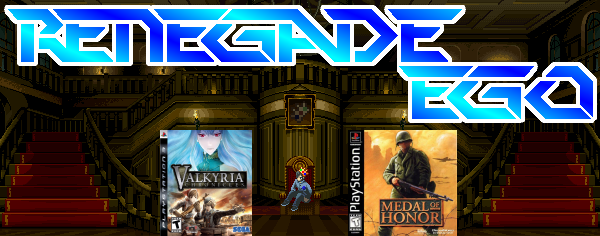

This is the first blog of 2014, ladies and gentlemen. Just ignore the fact that I posted this in late June; we're kicking off the new year! And what better way than with my first PS3 game? I have to imagine there are several better ways, because that first PS3 game is Valkyria Chronicles, and I'm.....a little conflicted about this. On the one hand, the story's hot shit. It's too childlike and idyllic, traits you shouldn't include in a game about World War II (and, by extension, the Holocaust). Normally, this would be enough grounds for me to dismiss the game outright, but then that other hand comes into play and punches me in the face with gameplay. So thoughtful, so tactical, such a perfect balance between strategy and action....What the hell do I do with this game?
How about we start with the story, like I always do? It all begins in the happy, peaceful nation of Gallia. One day, while they're singing about brotherly love and peace among men, the big bad Empire sends their metal death monsters in to murder kill all the happy Gallains. But worry not! Lieutenant Welkin Gunther is here to.....are you seeing the problems, here? The story's too saccharine for its own good. Keep in mind that there's a long-lasting, continent-engulfing war going on. You've gotta treat that shit with reverence; put in the time and attention to detail necessary to make sure you've done the complex social and political issues justice. Valkyria Chronicles, unfortunately, does the opposite. In this game, war's fun and happy. There might be some sad moments, but nothing severe. For example, the worst a forced labor camp does to you is leave you a little bummed out. Other than that, war's just a fight between heroes and villains. Nothing more. Also, nothing better. Worse than that, though, is that the game's only very barely aware of these problems. It'll try to add some complexity (like resource scarcity motivating the war (at least until the end)), but only in conciliation. The game's less trying to treat the subject of war with the respect it deserves, and more trying to cover its tracks. And the story's full of moments like these. It's like the story is parodying itself, only with some very worrying implications.

For instance, let's consider the racial themes in this game. There are three races in the world, but only two worth considering: the Darcsen, whose distinguishing trait is that they all have short dark hair, and the Valkyria, who essentially gain superpowers by huffing magic gasoline. The Empire's sending the Darcsens into forced labor camps while simultaneously using the Valkyria to win the war. Our allegiances seem clear: Darcsen are the victims, and the Valkyria are to be maligned. Until we actually see the Valkyria, that is. Then, they're absolute demigods, raining righteous fire down upon their enemies, shining in glory about the battlefield. The game can say they're supernatural and inhuman all they want, but that does little to abate their godly status. You're not supposed to look down on the Valkyria; you're supposed to look up to them. And the Darcsens? Well, at this point, I've completely forgotten about them. Too focused on wanting to be the bad guy, you see. Wonderful.
Maybe the characters can redeem this game, right? Oh, I wish. You can sum up most of them in one, maybe two traits. "Largo's large and likes vegetables", "Rosie sings and is anti-Semitic", "Alicia only exists to bolster Welkin's character, even when it makes no sense", etc. This is a cast that makes you want to look up the official criteria for diagnosing Asperger Syndrome. Especially Welkin. You know what I said about the story being a cheery Disney movie about World War II? Welkin ratchets that attitude up to some very high number. Somehow, even in the worst situation you could possibly imagine, he keeps a calm, upbeat, positive outlook on things. That may sound admirable until you realize it's the result of delusion. There's a reason I made the Asperger joke: Welkin's into bugs and plants. Like, really into them. He can only perceive the world through obscure species of beetle, and to him, this is completely normal. Hell, at one point, he compares Alicia to a bug, thinking it's a compliment. Funny, right? I'm guessing that was the intention, but it just makes the problems I listed before a little worse. It's like he's brushing aside war as nothing serious so he can get back to his precious bugs. Joy.
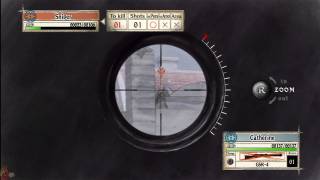
But even ignoring those problems, he's still not a very interesting character. His motivations are "to pass good things down to the next generation." Those are his words. What weak, utterly bland and meaningless motivations. This makes his status as the focus of the first half of the story all the stranger. Then again, I can't imagine many characters whom I'd especially enjoy the story focusing on more. The only character worth considering happens to work for the enemy, but she's an exception. For all the individuality your own squad mates have, every single enemy is just some generic fuck who can be replaced in a heartbeat. You know, almost like you should follow the Imperial example and regard your enemies as inhuman vermin.
But there's hope yet. Have you perhaps noticed that the entire story takes place largely from one perspective? Or how about that art style? It looks time worn, like the game is a series of old war photos being presented to you. You know, like you're looking back on the game's events rather than playing through them. And then there's the fact that you advance through the story line by line, page by page. My point? This is a fairy tale. I know that sounds redundant, but hear me out. The events of the game did happen, but not exactly like this. Somebody's changing the details (smart money's on Welkin) to present their side in a far better light. Looked at this way, the story's far more salvageable. Yes, the simplicity's still there, but it's something to work against, and the source of the story's quality. Now you're trying to figure out not only what details have been changed and why, but also what actually happened over the course of the war. It's subtle and t-What's that? There are some Empire scenes that Welkin couldn't have possibly known about or guessed at? And the game's fairly clear about what the framing narrative is? OK, nevermind. The story sucks. Go about your business, everyone.
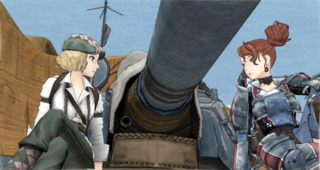
The gameplay, on the other hand, is simply amazing. I don't even know where to begin. I don't even really know how to describe it. Ogre Battle: The Third Person Shooter? You choose which unit to command from a huge military map, and then zoom down to them and take control of them manually. You walk forward, pop a few shots off on a guy, and then retreat to cover. That may sound simple, but there's actually a lot to keep track of. You've got to know where everybody is, where they're facing, what their weaknesses might be, how much ammo some of your units have, and maybe some other stuff I haven't gotten into. You have to think tactically about every move if you want to win. Needless to say, the atmosphere is tense, uncertain, almost like you're fighting in some kind of war.
Despite that (or maybe because of that), Valkyria Chronicles can be pretty rewarding, too. As tense as the scenarios can be, there's something to be said for placing your troops in such a way that the enemy can't advance a foot. Or watching an enemy scout run into one of your shocktroopers (hint: it doesn't end well). It's the feeling of watching all the pieces fall perfectly into place, and seeing everything go exactly as you planned. I'd call it 機能美, but a lot of stupid shit keeps that idea at bay. Of course, I mean stupid in a good way. Like using all your commands to sneak one unit through the Normandy landing to conquer a single base while only killing one, maybe two enemies on the way. No, seriously. How dumb, yet utterly brilliant. And what a perfect demonstration of what makes this game good: planning. Put in the time, and Valkyria Chronicles will reward you well. True, some of your shots can feel like they rely too much on luck to plan for (like missing a blow to the head at point blank range), but that doesn't happen enough to make the game any worse.
The only real downside to the gameplay's in the minutiae. On top of all the exciting battles, you also deal with some not-so-exciting bureaucracy. Things like leveling up soldiers, upgrading/managing their equipment, and taking advice from old guys who hang out in cemeteries. I imagine all these options are supposed to make you feel as though you're becoming more powerful as the campaign ramps up, but that doesn't really happen. Enemies die to about as much firepower at the start of the game as they do at the end, and you almost never get any new abilities from upgrading your guys. Since you can't see what your upgrades are doing, they just become needless busywork. And then there are all those special perks on each soldier to worry about. Great. Actually, that's the wrong tone. None of these ancillary features detract from the game, but they don't necessarily add a lot to it, either.
And that's Valkyria Chronicles. What the hell do I make of it? I just spent the last few paragraphs telling you how the gameplay manages to balance so much and how it puts the "tactical" in tactical RPG. But just before that, I railed against its fairy tale interpretation of severe human suffering and death. How do I reconcile such disparate stances? Simply put: I won't. I'll leave it up to you. You want gameplay? Get this game. You want story? Go play something else; maybe Little Inferno I don't know. I'm talking Valkyria Chronicles, here.
Review Synopsis
- Hey, remember how Path of Radiance handled topics like race and war and genocide and all that other heady shit? Imagine if somebody else did it, but without as much pesky thought put into it.
- Hey, remember how Path of Radiance had brilliantly balanced strategic gameplay? So does this game.
- Hey, why's Tom from Toonami such an asshole?
It is a glorious madness. It cannot be understood, nor can it be misunderstood. It simply is.
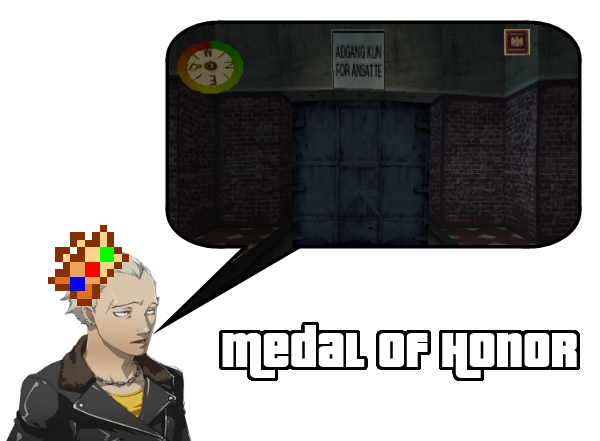
And now we shift toward America's take on World War II: Medal of Honor. No, not the 2010 reboot that nobody remembers (hell, I confused it with Warfighter for the weapon controversy), but the 1999 one made by Dreamworks. Surprisingly, that explains everything that's wrong with this game. I mean, Dreamworks made Shrek shortly after this, which explains why Medal of Honor is so concerned with fantasy and grandeur. Dreamworks also makes movies, which explains why this game fails to deliver on any of that grandeur. Hell, the game doesn't even have decent gameplay to mitigate those problems. It just sucks.
A large part of that suckage comes from just how powerful the game makes you feel. Not on its own, mind you, but that certainly plays a part in why I don't like the game. Every single little aspect of this game is dedicated to making you feel awesome. That stuff about the Nazis and World War II? Just window dressing. (Window dressing that paints the Nazis as gleefully evil scum, but that's probably the least of this game's worries.) You start up the game, and already, somebody's telling you how awesome you are. Holy shit! I barely had to do anything, and already, I feel amazing. No time for that, though. You're on a mission to save the world from utter Nazi annihilation (annazilation?). And then again. And again. And again. That's pretty much what the whole story's like: a bunch of missions of the utmost importance. Not that there's anything wrong with that. Yet. All that weight does a good job getting you to play the game, since all your actions feel significant. Hopefully, the scenarios are challenging and exciting enough to justify the sense of importance the game places on you and all your actions.
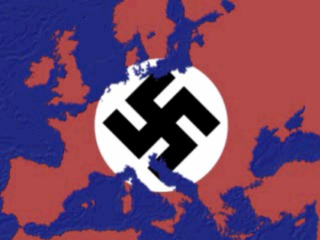
They aren't. They aren't even remotely close to challenging or exciting. The game sets the lowest bar it possibly can, robbing your actions of any legitimate importance. For example, the enemies: they're all Nazis incredibly weak. Your character can take quite a bit of punishment, yet he can send Nazis flying back nine feet with a single bullet. Literally; they actually fly backward when you shoot them. They also only come out in very small numbers; usually one or two at a time. Just enough to pick 'em off as they come at you. So instead of anything like urgency or tension, Medal of Honor instead doles out mere targets for you to shoot down. I'd say that's quite some distance from what the more explicit narrative is preaching, but the gameplay's still close enough to tamper with it. I mean, it's kind of hard for the game to make you feel good about yourself when it doesn't offer a formidable opponent, isn't it? True, the game gets better about this later on as it throws more enemies your way. But alas, it isn't enough. The tone has already been set.
The levels themselves don't help matters. If anything, they only make things exactly the same. Much like the enemies, the levels themselves aren't that complicated. You get a few goals to accomplish, and they're all arranged in what is essentially a straight line. Complete them out of order, and there's a good chance you skipped one of them by accident. To be perfectly fair, it is rather convenient that the game telegraphs these things to me. At least under these conditions, I won't spend half my time wandering around in search of that one item I missed. (I mean, I still did that, but I couldn't really pin any of that on the game.) But again, it's these conditions that suck any sense of satisfaction out of the game. There's no challenge. The game's simply spoonfeeding me victory and then telling me I'm a great person because of it. It all creates this weird dissonance between what the game tells me is happening and what's actually happening as I play.
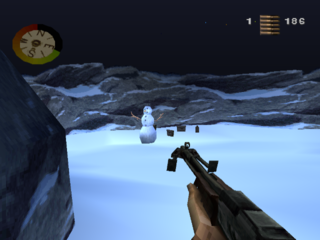
Perfect example: there's this one level where you have to sink an enemy sub from within. That may sound simple, but there are actually several other things to worry about in order to sink the sub. My mission briefing even says I'm on a tight time limit. That may sound complicated, but everything I need to do is clustered into one small area. Plus, the briefing lied: there is no time limit, and even if there was, I doubt it'd be much of a problem when the exit is three feet away. So with enemies who only exist to die and levels that don't leave much to the imagination, I feel like any joy I derive from the game is unearned. What place do my own skills have in this world? Failure was never a viable option. I couldn't even bump up the difficulty in case I wanted feelings of legitimacy. (Or if I could, I never figured out how.) This was all the game was offering me.
If I had to say something positive about the game, I'd have to go with the visual design? As that question mark should indicate, this idea is difficult to explain. The levels feel like real places? I mean not in the act of playing them (again, they're little more than hallways), but in the act of experiencing them. There's a fair amount of detail in these areas. They often feel like living, breathing places, rather than just arenas for Nazi shootin'. That goes for the enemies, too; they feel like actual people. Not because they always respond to your presence with bullets, mind you, but in all the other ways. Despite only being able to survive two bullets, you're still going to see them near death quite a bit. They'll crawl around, stagger on their knees, generally behave like somebody who got shot in the chest. So, if nothing else, at least the game presents a believable world.
But, of course, that's not enough to redeem Medal of Honor. I mean, we still have to deal with the lack of challenge. I know that I've probably beaten this point quite deep into your skulls at this point, but it really is the one linchpin holding the game together (well, not holding it together, in this case). With all its praise of your various escapades, the story needs challenge for any of that praise to make any damn sense. Without that challenge, it feels like the game is selling itself short, telling you how great you are for the most minor of deeds. Maybe there's something worth digging into if you can power through the easier sections, but that's asking a lot out of the average player.
Review Synopsis
- Your mission, should you choose to accept it, is to kick some Nazi ass.
- They have large asses, so they shouldn't be that hard to kick.
- Also, do some other stuff, if you have the time.
- Man, that Mission Impossible reference got weird fast.